- Home
- David Pilling
Reiver Page 2
Reiver Read online
Page 2
Archie spurred towards him. The old man's battered face was grey and lined with exhaustion, his sword flecked red.
“Are you hurt, nephew?” he rasped.
Richie shook his head. “No,” he answered. “Yonder beanpole almost took off my head, but I settled him.”
His uncle glanced down at the dead reiver. “God have mercy on us,” Archie muttered softly. “I knew the man. Geordie Armstrong. One of Nebless Will's sons.”
Richie paled. Nebless Will was one of the senior Armstrongs. Richie had slain no common reiver, but one of high standing among his folk. A man of ‘hame and name’, as the Border saying went.
“I heard them call your name,” said Archie, looking bleakly at his nephew. “From this night on, Nebless Will and all his folk will be after your blood. I know those bastards. They would pursue a feud beyond the gates of Hell itself.”
“Our blood,” Richie corrected him. “The feud will stand between our family and theirs.”
This was grasping at straws. The Reades could not hope to stand alone against the wrath of the Armstrongs, who could put as many as two thousand men in the saddle. Nebless Will alone commanded a hundred lances. Unless Richie was delivered up to them for punishment, Crowhame would soon be wiped off the map. The village and its people might be destroyed anyway, just for spite.
Richie stared hopelessly at his uncle. Already he felt the rough hemp of the rope about his neck. Or else the Armstrongs might drown him, or hack him to death, or come up with some more inventive punishment. They were devils rather than men, with a limitless talent for cruelty.
Archie ran a hand through his short white beard. “I'll not hand you over,” he muttered. “Give up my brother's son to the likes of Nebless Will? Never.”
“Curse my folly,” he added. “We should have let the Armstrongs have the kyne and sought redress from the Warden.”
He meant Sir John Forster, the English Warden of the Middle March. The mention of his name caused Richie to grimace.
“Forster is hand-in-glove with every Scotch and English thief from here to Carlisle,” he spat. “We may as well slit our own throats than look to him for protection.”
By now they had gathered an audience. A few of his cousins stood around and listened in silence. Others went to drive the kyne out of the water or retrieve horses.
Archie turned his head to look north, towards the border and Liddesdale. His leathery features were taut, eyes narrowed.
“Forster is a thin hope,” he said after a while, “yet we have no other. Only the law can shield us now.”
3.
On a flat field outside Hexham, two teams of six men faced each other. It was a chill afternoon in mid-October, yet they were stripped to their shirts and breeches. Mist from their breath rose into the cold, still air.
The atmosphere was taut. Even the jeers of the crowd, gathered in ranks on the edges of the heath, had died down. Every man glared at his rival in the opposing team, waiting.
A rider trotted into the narrow gap between the teams. An old man, this one, yet straight-backed in the saddle, white hair cut brutally short. His little forked beard adorned a long, lean face, cut deep with lines carved by nature and seventy years of harsh Border winters. Grey eyes full of cunning peered out from under tufted brows, while his bony snout only increased the man’s resemblance to a wary old hound, sniffing the air for danger.
The old man rode a hobbler, much like any reiver might own, though sleeker and more well-fleshed than most. His dress spoke of high rank: a belt of gold links, a sword with a silver basket hilt, a padded doublet of fine black velvet, riding boots of costly black leather. A silver chain of office hung about his withered neck.
“God bless Sir John!” a woman’s voice burst from the crowd. “Saviour of the Middle March!”
A ripple of laughter followed, mixed with a few good-natured insults and one or two genuine boos. Sir John Forster, Warden of the Middle March, smiled thinly. He was hated, loved and envied hereabouts in roughly equal measure, and cared little for any of it. So long as he was obeyed.
In his gloved right hand he clutched a leather ball – called a baw – decorated with colourful ribbons. The voices faded away as he slowly held it aloft.
“Go to it, lads,” he called out in his rough, cracked voice. “May the strongest and luckiest win the day.”
His narrowed eyes, set deep in their nests of wrinkles and laughter lines, flickered briefly at the captain of the team to his left; John Fenwick, a gentleman of sorts from over Bewcastle way. Sturdy and barrel-chested, with tousled brown hair and hands like shovels, he looked more farmer than gentry.
There will be no luck involved this day, thought Forster, not if Fenwick wants to see his five pound.
He spurred his pony on a few paces, twisted in the saddle and lobbed the baw high into the air. A tremendous shout rose from the spectators as the two teams hurled themselves at each other. They met in a tangle of bodies and fell to fighting like wild animals for possession; kicking and punching and gouging, snarling and wrestling each other to the ground. While the battle raged, the supporters of both sides in the crowd egged their boys on with furious shouts, full of venom and passion and spittle-flecked hatred.
“Get intae them, Christie’s Jock – put the boot in, man!”
“Tear his fuckin’ bollocks off!”
“Wide, lads, get it wide, the fat buggers have got no pace out there!”
“Stuff the baw up his arse, Jack Fenwick!”
The field was roughly eighty feet long and forty wide. At either end, planted in the centre, were two sets of wooden posts with a crossbar. Points or ‘hails’ were scored when a player managed to throw the baw over the crossbar. As yet there was no sign of any score, since the baw had vanished among the heap of struggling bodies. Both sets of players seemed more intent on tearing each other to pieces than playing the game.
Forster quietly trotted back to the western end of the field, where he could watch the massacre at a respectable distance. His secretary, Christopher Tweddle, waited for him. Tweddle was a quiet, pinch-faced man, currently almost lost inside a heavy cloak, gauntlets, three scarves and a padded bonnet. His long red beak protruded from the narrow gap between scarf and bonnet. A pair of beady little eyes glimmered inside.
Next to him stood the Warden’s bodyguard, four soldiers of the Hexham garrison. These tall men in steel breastplates and crested morions kept a watchful eye on the crowd. Their master had plenty of enemies, and an assassin might spring from anywhere.
The Warden watched the game unfold with a growing sense of unease. He had wagered Willie Yarrow, a gentleman from the West March, twenty pounds that Fenwick’s team would lose. On the quiet he had promised Fenwick a quarter of the prize money if he agreed to throw the game.
So far the Fenwick boys had failed to follow orders. They were probably the best handbaw team in the whole of the West and Middle March, skilled and fit and brutal, while their opponents were a clumsy mob of also-rans.
“Damn your eyes, Fenwick,” he muttered to himself. “Double-cross me and you’ll regret it.”
He glanced at the opposite end of the field, where Willie Yarrow and a knot of his shabby kinsmen sat on their hobblers. Yarrow lifted his bonnet and cheerfully waved it in Forster’s direction.
The Warden’s knuckles turned white on his reins. Betrayed! Doubtless Yarrow had offered Fenwick a greater cut of the prize for winning the game.
Anything to embarrass me, Forster thought angrily. Yarrow was one to hold grudges. He'd never forgiven the Warden for hanging one of his cousins, a murderous rogue who burned a woman and her bairn alive inside their cottage.
The Warden’s rage deepened when one of Fenwick’s team broke loose of the pack and sprinted, fleet as a deer, towards the posts. The baw was clutched in his right fist, ribbons streaming. The roars of the crowd rose to fever pitch. An opposing player hared after him, dived and caught him by the thighs. As he fell, Fenwick’s lad executed a superb pass out
of the tackle, flinging the baw out to his mate on the wing. With clear space in front of him, this man ran to the posts and threw the baw high over the crossbar.
Delighted cheers erupted from the Fenwick supporters. The baw plunged into a group of youths clustered behind the posts. They fell to fighting for it, clawing and stamping, until a brawny girl with a mass of ginger curls tore the baw free from the scrum and hurled it back onto the field.
Forster’s clerk gave a discreet little cough. “The biter bit, sir,” he murmured smugly, wiping his nose with a kerchief.
The Warden cuffed the back of his head. “One more crack like that, Tweddle,” he growled, “and I’ll have you cleaning out the privies for a week.”
They watched the game in sullen silence. Within half an hour Fenwick’s lads were up three hails to none. After an hour, with the score at seven-two, one of their opponents had to trudge off the field with a broken arm. His teammates struggled on manfully, but to no avail.
Forster’s black mood was not improved when a soldier came riding from the town. “Beg pardon, sir,” the man said, touching his brow, “you have a visitor. Archie Reade of Crowhame wishes to speak with you.”
“Bloody Hell,” Forster groaned, “where did you leave him?”
“At the Bailiff’s Hall.”
“Take him to the gaol and put him in one of the upper rooms. Have no fire lit. Don’t offer him any food or ale. Go.”
The soldier saluted and rode back to town. Meanwhile Forster kneaded the bridge of his nose and tried to think above the din around him.
Archie Reade. Forster had been expecting a visit from him ever since news broke of the skirmish at Crowhame.
The raid itself was nothing by the way, a pin-prick in the greater scheme of things. Yet it had ended badly. Very badly. Two Armstrongs slain, and they chief men of Liddesdale.
Two days previously a rider came to Hexham with a message from Nebless Will Armstrong. In return for peace on the border Will demanded the head of one Richie Reade of Crowhame. Richie, he claimed, had slain his kinsmen Anton and Geordie, and must pay with his life’s blood.
Will made the killings sound like murder, but Forster suspected the truth. Geordie Armstrong and his cousin Anton were most likely killed in the raid on Crowhame. The Reades were perfectly within their rights to kill Scots thieves – or anyone else, for that matter – in the defence of livestock and property.
The riding Names of Liddesdale usually carried out their own revenge. Lately, however, their power had been reduced. Last March Forster had joined forces with the Earl of Moray, Regent of Scotland, to wage war against Liddesdale. Moray scoured the valley from end to end, razed Mangerton and hanged thieves by the dozen. The survivors fled into the high hills and forests, only creeping back to their devastated homes when the troops had gone.
Liddesdale was just one of Forster’s problems. Over the summer dire rumours had reached his ears of conspiracy on both sides of the Border. Many of the reiver families were staunch Catholics and longed for the restoration of the Catholic Mary Stewart, former Queen of Scots, currently held prisoner at Tutbury in Derbyshire.
Forster knew the dread consequences of a Catholic uprising. The reivers, Scots and English, would throw their weight behind the cause. In his nightmares he pictured thousands of armed men, horse and foot, pouring across the border into northern England. Hard man though he was, the prospect made him shiver.
Who could stop them? Forster thought fearfully.
He knew precisely the strength of the English garrisons. Already overstretched and undermanned – Queen Elizabeth ever tried to rule her country on the cheap – they would be overrun within days. Maybe hours. And then God help Queen Bess, for the road to the south would lie open.
Now, in the midst of all this turmoil, Archie Bell of Crowhame had taken it into his thick skull to resist the Armstrongs.
What in hells possessed the old fool?
Archie was born and bred of the Border. He knew how matters lay. By rights he should have let the thieves go and then come to Forster for justice. Not that he would have got it – Forster cared little for the Reades or their troubles – but the principle remained. To anger Liddesdale at this moment, with the peace of two kingdoms in the balance, was to risk unleashing all the devils of Hell.
Forster decided to let the man stew. With luck, sat in a cold room above the town gaol without a sup or bite to eat, he would soon bugger off home. The Warden had yet to make a decision on Richie Reade, and preferred to avoid an awkward confrontation with his uncle.
As dusk came on the unequal game of handbaw came to an end. Bloodied and battered, hopelessly outnumbered and nineteen-three down on the score, the opposing captain offered his surrender. John Fenwick cheerfully accepted, and after shaking hands it was agreed to call it a day. To cheers and jeers and curses, the mud-caked players limped off the field (two had to be carried) towards the lights of alehouses, twinkling invitingly through the murk.
“Well played, Sir John,” Willie Yarrow remarked with a grin when Forster grudgingly paid over the prize money. “It was brave of you to wager against Jack Fenwick. A mistake you’ll not be making again.”
Forster resisted an urge to strike the man. It would only give Yarrow extra satisfaction. There were other means of revenge. The next time thieves descended on Willie Yarrow’s livestock, he could whistle for the Warden’s aid and see where it got him.
Hexham town gaol was a square lump of yellow stone with two storeys, a flat roof and narrow windows. It squatted in the middle of the town, behind the Bailiff’s Hall, where felons were put on trial before being consigned to the black dungeon under the gaol. Many a reiver had languished there, in the dark and filth underground, before being taken out to dance on the end of a rope.
The old Warden climbed stiffly off his horse and into one of the guardrooms, where a log burned merrily in the grate. He stamped his feet on the bare flagstones, blew on his chapped hands and wished himself forty years younger.
His secretary shuffled in carrying two cups of warm ale, heated by a red-hot poker thrust into the barrel.
“He’s still here,” said Tweddle, handing his master one of the cups.
“Who is?” scowled Forster, who still hadn’t forgiven Tweddle for his earlier jest. He took a long swallow of the ale and relished the liquid heat coursing down his throat.
“The old bastard. Archie Reade. He’s upstairs in the gallery, freezing his balls off. Won’t leave until he sees your face. So he says.”
Forster wiped his lips. “By rights he should feel my boot up his arse, damn him. All right.”
Brushing past Tweddle, he left the guardroom and stumped wearily up the narrow stone stair. The ale had taken the edge off Forster’s temper, but he was still tired and irritable, as well as out of pocket.
Getting old, he thought. Aged seventy, the stresses of his impossible job weighed heavier on Forster's shoulders by the day. Still, he would never freely give up the post of Warden. Retirement was for the dead.
He found Archie Reade in the long chamber above, gazing bleakly through one of the narrow windows. The room was cold as a grave. As per Forster’s instructions, the fire was unlit. There was not a stick of furniture. Forster would have wagered a shilling – though not against Willie Yarrow – that Archie had been on his feet all the while.
Archie appeared to sense Forster’s presence and turned on his heel to face him. The two fierce old men glared at each other.
“Sir John,” Archie said after a time, “your hospitality does not improve. I would have got a warmer welcome in a dog-kennel. Or Liddesdale.”
Forster stepped inside and rested his sore back against the wall. “Then go to either,” he grunted, “or Hell if you prefer. Take your fool nephew with you. Richie O’the Bow! Richie O’the Blockhead, more like. His uncle’s not much better.”
It pleased him to see spots of colour appear in the old headman’s sunken cheeks. Archie cut a strangely dignified figure in his patched breech
es, cracked boots, worn cloak and greasy old bonnet.
Proud in his rags, thought Forster, like every reiver chieftain with barely two pennies to scratch together.
“I came not to be insulted,” Archie replied stiffly, “but to ask the Warden’s protection. My village is under threat.”
Forster folded his arms. “Aye, I know. Two days since a rider from Nebless Will came to me. He demands your nephew’s life in blood-payment for his dead kin.”
Archie went very still. “Will you give it to him?” he asked quietly.
Forster shook his white head. “No. You should know me better than that. I don’t bow to demands, especially not from rogues like Nebless Will. However. Liddesdale must have something, if we are to have a quiet Border.”
“To that end Richie’s bill shall be fouled for murder, and he declared an outlaw. The same for any who choose to ride with him.”
Archie went crimson. “This is unjust!” he cried, “Richie has broken no law. He shot Anton Armstrong in the act of lifting kyne – caught red-handed! Geordie he slew in fair fight on hot trod! There is no question of murder. What of our men they slew? Thanks to those bastards, two of my kinsfolk now lie cold and stiff in the ground!”
Forster leaned forward slightly and jabbed a finger at the other man. “Save your passion,” he snapped. “We're both old hands at this game. You know what must be done. There is no saving Richie, but I’ll send word to Nebless Will and Liddesdale that Crowhame is not to be touched. The feud begins and ends with your nephew.”
The old headman snatched off his bonnet and wrung it in his gnarled hands. “Will you – will you at least send troops to help us defend Crowhame for a time?” he asked.
Forster almost laughed. “Troops!” he exclaimed. “I have few enough soldiers already without sending good men to guard your pigsty.”
“Sir John Forster,” Archie said, slowly and deliberately, “your mind ever gropes along crooked paths. Your words are so much piss in the wind. Liddesdale may ride in force to destroy us, and you, the so-called Warden, won’t lift a finger to help. Man, you hold a commission from the Queen! What slackness and cowardice is this?”

 The Growth Delusion
The Growth Delusion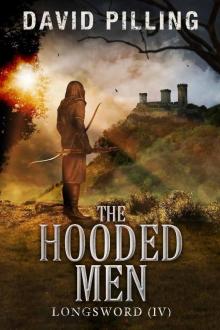 The Hooded Men
The Hooded Men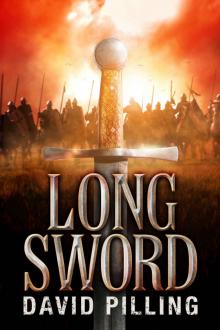 Longsword
Longsword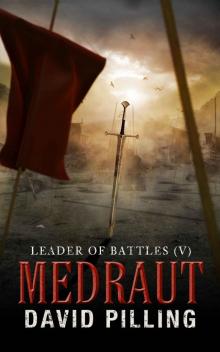 Medraut
Medraut Hardway
Hardway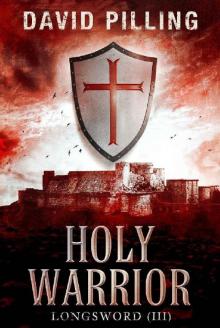 Holy Warrior
Holy Warrior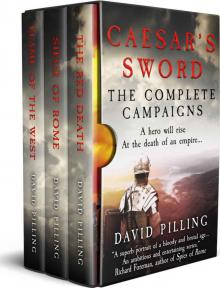 Caesar's Sword: The Complete Campaigns
Caesar's Sword: The Complete Campaigns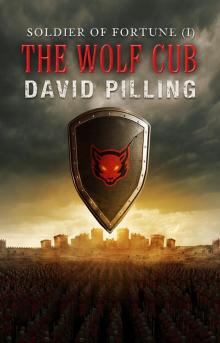 The Wolf Cub
The Wolf Cub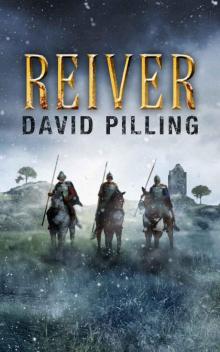 Reiver
Reiver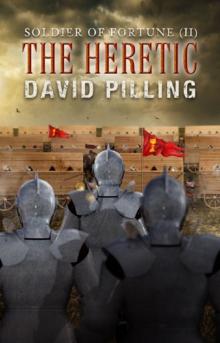 The Heretic
The Heretic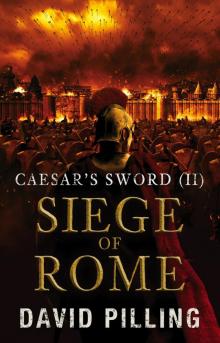 Siege of Rome
Siege of Rome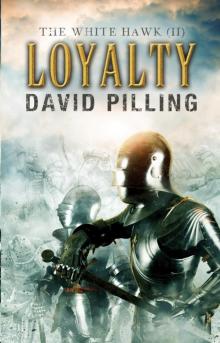 Loyalty
Loyalty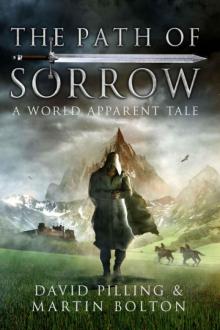 The Path of Sorrow
The Path of Sorrow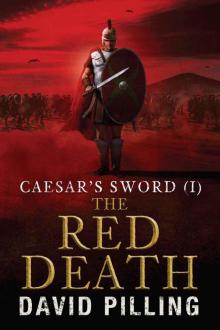 Caesar's Sword (I): The Red Death
Caesar's Sword (I): The Red Death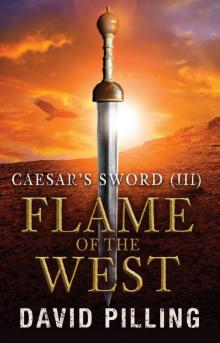 Flame of the West
Flame of the West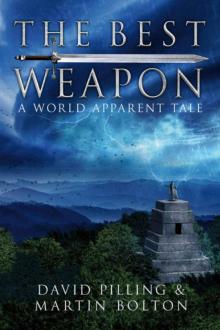 The Best Weapon
The Best Weapon Sacrifice
Sacrifice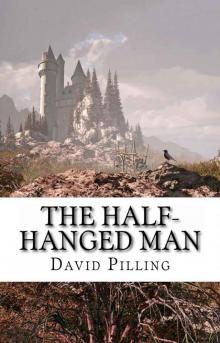 The Half-Hanged Man
The Half-Hanged Man